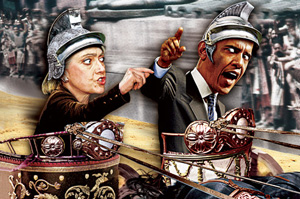Click above to visit the entire site
Friday Fronts
2 May 2008:
James Wolcott on the Political Scene, in Vanity Fair.

Midway along the pathway to the next presidential election, it is handy to have James Wolcott's overview, in the current issue of Vanity Fair, of the game so far, especially now that the contest for the Democratic Party nomination has lived down to the most pessimistic expectations. Mr Wolcott is especially acute about the impact of John Edward's disappearance from the race.
A born-again populist, Edwards functioned as a lubricant, a slick lining separating—and dampening the friction between—two competing iconographic surge forces (the first black presidential nominee versus the first female nominee) and drawing enough support on Daily Kos and other liberal-Dem Web sites to diffuse the animosity, competitive zeal, and gender-generational differences between the two camps. Once Edwards dropped out of the race, however, the buffer zone was removed, direct contact replaced triangulation, and the Obama and Hillary supporters faced off like the Jets and the Sharks.
As I turned the pages, however, following the columnist into Kossack territory, I was reminded of the last presidential race, which ended just as my own Daily Blague was lifting off. The Daily Blague was born in the ashes of bitter political disappointment. I had never been certain that George W Bush would lose the election, but I had hoped for his defeat as ardently as anybody. The real disappointment, though, was discovering the impotence of what had struck me as an endless barrage of concise arguments and cogent observations. All that enthusiastic intelligence had failed to transform the Augean stables back into the White House. We might as well all have been talking about the weather. It occurred to me that we might really have done better to talk about civil society. In a democracy, each of us has one, and only one, vote; but in a civil society, there's no telling how far well-considered behavior will ripple.
For starters — and, truth to tell, I haven't gotten past this point — there is the importance of attentiveness. We seem to be wired to pay attention to novelty, but this proclivity, like so many (such as our taste for salt), seems less than helpful in world that is both generally devoid of dangers and furiously manipulated by advertisers. What we need to pay attention to most, I think, is the set of our personal connections; and this, in turn, means paying attention to ourselves from the least comfortable angle: from the outside. There's no time to worry what we look like or what people think of us. We must simply do the best that we can with the common sense and generosity that we possess. The Zen and Stoic virtues are largely commendable but deadly as habits.
Alongside the distraction of novelty, there is the corrosiveness of fear. It's my belief that people like George W Bush win elections on the votes cast in fear. Americans, a self-selecting race, are probably no more prone to fear than others, but their fears are more likely to be groundless, rooted not in concrete worries but in a kind of buyer's remorse: we have all inherited our ancestors' anxiety about making the crossing. As the dreadful plague of flag pins makes clear, it's not enough — paradoxically in this nation of territorial citizenship — to be born an American. The patriotic muscles must be bulked up, and, short of dying for the United States, one can never be patriotic enough. Patriotism, in other words, is nothing but an inverted dread, a fear turned inside out, like a latex glove. Instead of enfolding our hand, it thrusts into our neighbor's face. My attentiveness, then, leads me to see patriotism — at least in its free-floating, vernacular form, waving flags for the sake of waving flags — as a pernicious fearfulness.
Ultimately, my idea of civil society sounds in the key of stewardship. I don't care how we got here, but I do feel a responsibility for taking care of the place, while at the same time I am mindful of the sheer shock of discovering, as our species has done only within living memory, that we can wreck it.* What the issues of stewardship mean for my daily life — how ought it to be different? how can it be different? — make the primary campaign seem like a conversation among second-graders. I don't pretend to rise above politics: my decision to vote for the Democratic candidate in November, whoever it may be, is as thoroughly considered as I know how to make it. But that is the beginning and the end of my direct political engagement. As long as society is civil — and never in my American life have I felt society to be so civil as it is in New York City — my politics will be busily indirect.
* Earlier generations' conviction that the world could be wrecked by divine retribution was something utterly different.
Copyright (c) 2008 Pourover Press